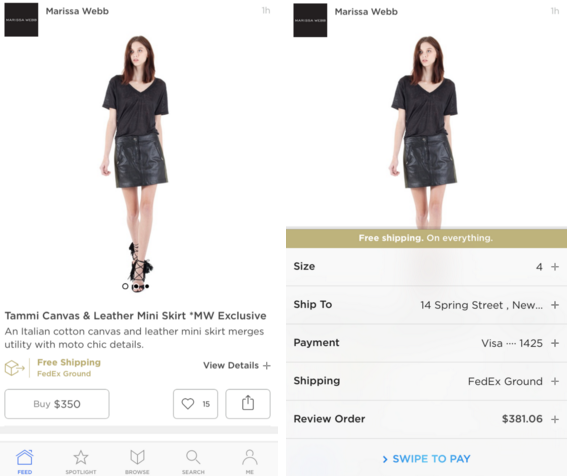Secure your place at the Digiday Media Buying Summit in Nashville, March 2-4

Spring, the mobile commerce marketplace that sells fashion and beauty products from a mix of wholesale brands and retailers, is partnering with, of all things, Kim Kardashian: Hollywood in order to grow its user base.
The app is launching a virtual boutique inside the smash mobile game in order to get its name and items in front of the game’s tens of millions of users. Beginning today, players of Kim Kardashian: Hollywood can dress their avatars in items from 12 brands sold on Spring, like Jonathan Simkhai and Clare Vivier. Through link-outs within the store, players are nudged to download the app and sent to a pop-up shop within Spring to shop the items.
Spring isn’t the first company to make an appearance within the Kim Kardashian: Hollywood game. Designers Karl Lagerfeld and Olivier Rousteing have promoted pieces from their collections in the app before. Spring, however, is the first mobile commerce marketplace to sell multiple brands at one time through the game, looking to the app as a play to introduce a wider, and younger, demographic to the marketplace as it closes in on its second year.
After a 2014 launch, Spring has grown to sell thousands of products from home, beauty, apparel and accessory brands and raised a total of $32.5 million of venture capital from two rounds of funding, most recently in April 2015. The app’s interface is similar to Instagram’s, bringing up a feed of inspirational product images from an assortment of brands, personalized to a user’s indicated interests. Instead of comments and likes beneath the pictures, though, there is product information: sizing, price and item details. When a credit card is stored, all a user has to do in order to place a purchase is select a size and swipe to the right on the screen.

Spring CEO Alan Tisch believes the combination of easy checkout and engaging interface (a feed of Pinterest or Instagram like images) set it up for long-term mobile commerce success. While mobile commerce is projected to be worth more than $400 billion by 2019 by eMarketer, retailers are still struggling to get broad usage by customers in their individual mobile apps.
“There is app fatigue,” said Tisch. “There are so many apps and products that the value of creating unique experiences has only gotten higher and higher. For us, we’re thinking about how people are going to shop on the phone over the next decade — it’s a long-tail approach.”
Tisch would not disclose how many daily users Spring has but noted that more than 1,000 brands now sell on Spring, including those like Urban Outfitters and Everlane, which have invested in building their own mobile apps. He said that Spring doesn’t expect its customers to shop every day but said instead they will visit regularly in order to kill time by scrolling through the feed, which he considers a smartphone version of window shopping.
“What Spring is doing is interesting because of the data it’s pulling in on the backend, and its ability to sign on brands,” said Cheryl Chang, a partner at BlueRun Ventures. “They’re also training the consumer to purchase in a different way — swiping — while inspiring them. Instagram has toyed with the buy button, but the majority of Instagram isn’t a branded feed.”
With its latest move to Kim Kardashian: Hollywood, Spring is looking to drive more consumers, as well as a younger demographic of users, to download. It’s also adding more lower-priced brands, like Urban Outfitters, to complement the pricier options, like Helmut Lang and Marissa Webb. Spring also recently launched an e-commerce store so people could shop from desktop as well as smartphone.
Tisch admitted that the hardest part of getting new people to download Spring is putting the app into context for those who haven’t used it.
“Mobile app marketing is a challenging space,” he said. “You have to combine context and personalization, and understand who we’re talking to, and that differs between platforms.”
More in Marketing

Thrive Market’s Amina Pasha believes brands that focus on trust will win in an AI-first world
Amina Pasha, CMO at Thrive Market, believes building trust can help brands differentiate themselves.

Despite flight to fame, celeb talent isn’t as sure a bet as CMOs think
Brands are leaning more heavily on celebrity talent in advertising. Marketers see guaranteed wins in working with big names, but there are hidden risks.

With AI backlash building, marketers reconsider their approach
With AI hype giving way to skepticism, advertisers are reassessing how the technology fits into their workflows and brand positioning.








